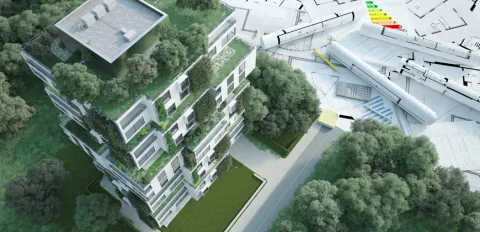Guest Speaker Series: Developing a Sustainable Future

- Master of Engineering Leadership
Earlier in March, UBC Master of Engineering Leadership and UBC Master of Health Leadership and Policy students were elated to hear from Henry McQueen, Vice-President of Development at Qualex-Landmark™. The session was an hour-long virtual discussion on real estate development, integrated and sustainable design, as well as looking to the horizon for what homes for future generations could look like. Henry is a proud UBC alumni, a Registered Professional Planner, and also serves as Vice-Chair of the UDI-Pacific Region’s U40 Executive Committee and Vice-Chair of Co:Here Housing Community.
In his current role at Qualex-Landmark, Henry is responsible for overseeing the development project pipeline, assessing project feasibility, developing the strategic vision for each project, and advancing design through to construction.
Qualex-Landmark™ is a Vancouver based development group with over two decades of expertise in building boutique residences. Their portfolio is defined by quietly iconic award-winning residential communities born out of a highly detailed approach to development and innovation. Driven towards targeting sustainability, projects by Qualex-Landmark™ such as Pomaria, Aria and Green on Queensbury have achieved LEED certification recognizing their effort in creating green buildings. Students across the MEL programs share this desire to drive innovation in the building industry.
Sustainable design and development
Henry introduced students to the idea of Sustainability by Context which he explained was the idea of sustainable design meaning more than just reducing GHG dependence and energy efficiency. Sustainability by Context, Henry explained, also means more inclusive and affordable communities.
Thinking about communities within a regional context is crucial when considering issues of resilience, affordability and environmental stewardship. On the issue of housing affordability, Henry highlighted the need for effective partnerships between the public, private, and non-profit sector to find creative models to deliver more housing in order to meet the needs of a growing population.
This conversation helped attendees better understand the needs and realities within Vancouver’s real estate industry and helped ground their course materials within a real-life context. One student commented that they enjoyed getting to learn about current projects because it helped them realise and consider what projects they could be a part of in the future.
Managing critical issues in environmental and social sustainability
In speaking about his inspiration for working in the sustainable development, Henry cited his fascination with cities and the limitless potential of communities within cities which can help manage critical issues around social inclusion, wellness, environmental sustainability, and economic resilience.
Developing sustainable buildings and reshaping the skyline of Vancouver and beyond is no easy feat. It will require talented developers, builders, engineers, and the communities living within these spaces to push for a cleaner and more sustainable future. UBC’s MEL in High Performance Buildings program is committed to developing such talent.
Through a combination of architectural courses on green building design, engineering courses on energy modelling and design, and leadership courses offered through the UBC Sauder’s Robert H. Lee Graduate School, the program equips professionals with needed skills and know-how to lead change in a high-growth industry. Curious to learn more about the MEL programs? Sign up for one of our upcoming information sessions.


